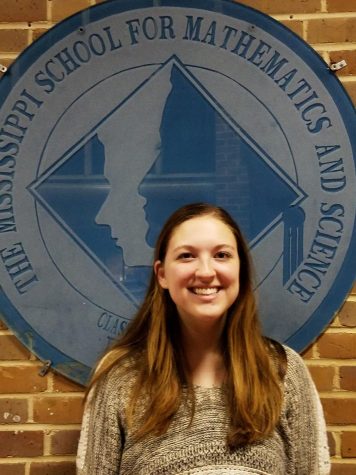MSMS Featured on EdTalk Podcast

Members of the MSMS and MSA communities participated in a recent EdTalk through MIssissippi State’s Research and Curriculum Unit.
December 11, 2017
“How does a specialized residential high school differ from a traditional high school?”
This is the question that EdTalk, a podcast formed by the Mississippi State University Research Curriculum Unit, asked on their December edition. Both application-based Mississippi residential high schools, The Mississippi School of the Arts and The Mississippi School for Mathematics and Science, were featured on the December podcast to discuss the answer to this question.
The purpose of the EdTalk podcast is to communicate and address education issues, facts and insights that are unique to Mississippi. Executive Director Dr. Germain McConnell, mathematics teacher Lauren Zarandona, and MSMS senior Daniel Smothers attended the EdTalk session to share their various perspectives as members of the Mississippi residential high school community. They each discussed what makes MSMS unique and the aspects of the school that contribute to its bright student body, engaged alumni network and successful education programs.
Dr. McConnell stated, “The thing that sets us apart is that we are a residential high school. We are selective in that we have the application process, and we are blessed to have a large number of academically gifted students on our campus.”
“The other thing is that we have students from all over the state of Mississippi. The synergy of energy is special. You live together in a residential setting and are able to talk about things at a very advanced level, which you could not ordinarily do at a traditional school.”
Zarandona relayed that her role was to discuss the difference between teaching at a typical high school compared to MSMS.
She described her experience conversing on EdTalk, saying, “We were asked a lot of questions. Specifically, I was supposed to talk about teaching here and the different approaches and methods we use. I also talked about what we do outside of the classroom, how that’s unique to our school, and what we do in outreach.”
The Mississippi School of the Arts was represented by MSA Executive Director Suzanne Hirsch, visual arts teacher Kelly Varner, and senior dance student Kenya Moore, who spoke about the differences and similarities between both MSMS and traditional high schools.
Some of the highlights in the podcast included the topic of student academic abilities, the benefits of residential life and the qualities that characterize an MSMS student.
Recorded on the EdTalk podcast, Zarandona added, “I think that our students are willing to take on challenges that they just wouldn’t be offered at their home schools because of limitations due to budgets.”
Smothers discussed one of the major things he enjoys about MSMS that makes it unique from his original high school.
“Honestly, I think the leadership opportunities it [MSMS] has provided for me has been something I’ve really enjoyed.”
He continued, “Here at MSMS, I’ve been involved in so many clubs, some of which I’ve been able to have leadership positions in.”
Finally, Mrs. Zarandona described one of the most interesting questions they were asked during the podcast interview.
“I will say one of the best questions was about how students are different, what the typical MSMS student looks like, and what type of student should apply. We agreed that gifted and talented doesn’t look like one thing, and that was a great chance to share that with other people.”
Dr. McConnell noted that it is vital to spread the word about MSMS through opportunities such as being featuring in an EdTalk podcast.
“Too many people in this state don’t even know MSMS exists, and too many people who know MSMS exists don’t know enough about what we do and the things we are capable of. It’s important to speak to different communities and try to reach everybody. This experience is different, and it makes it unique.”








